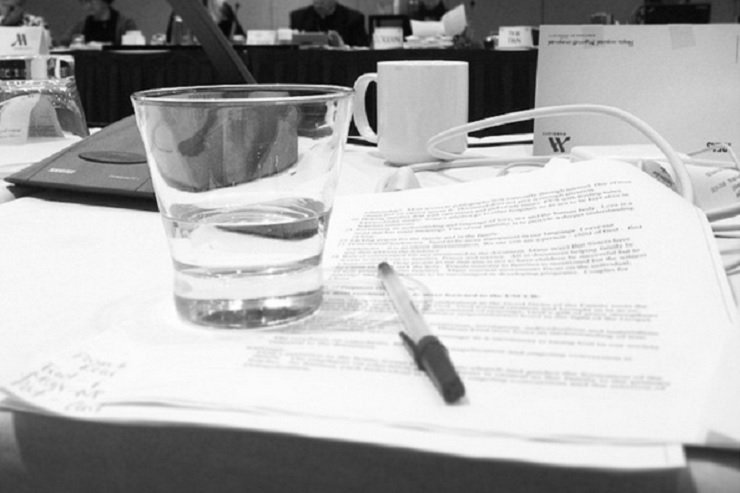Detraction and calumny are pernicious poisons. Through our words, we can wound reputations in a matter of seconds, and the damage can irreparable.
Today’s Gospel contains a warning from Jesus that is particularly pertinent today. It is a familiar image, but one that I probably need to meditate on every day.
“How can you say to your brother, ‘Brother, let me remove that splinter in your eye,’ when you do not even notice the wooden beam in your own eye?” (Luke 6:42)
How easy it is for me to judge my neighbor, believing I can know the deepest thoughts of their hearts, their intentions, and motivations. How quickly I assume I know best or that my views or actions are superior. It’s easy to make a comment, to fire off a tweet, or to assert an opinion without even pausing to think of the effect of my words.
Gossip is struggle for me. When I examine my conscience for confession and try to determine “kind and number,” I realize with horror that “number” is almost impossible to determine. How often do I lapse into gossip without even realizing that I am doing it?
It might seem innocent at first, perhaps sharing news with a friend or a coworker. But how quickly it can turn into speaking about a neighbor’s faults or situation, a story that is not mine to tell. First of all, we should pause and ask ourselves if we even know the whole story we are telling. After all, every story has at least three sides and chances are, we barely know one of them.
But what if it’s true?
The sin of rash judgment is prevalent and slippery in our culture today. “He becomes guilty…of rash judgment who, even tacitly, assumes as true, without sufficient foundation, the moral fault of a neighbor” (CCC 2477). How quickly and rashly I judge the hearts of even my fellow Christians.
A particular trap for Christians can be to spread gossip under the guise of asking people for prayers. It may seem innocent, but soon we’re sharing details and judgments and opinions. Saint Boniface wisely cautioned, “Go to church to pray, not to gossip.”
It can also be tempting to think that gossip is not gossip if it’s true! But the Catechism reminds us that one is guilty of the sin of detraction when he or she “without objectively valid reason, discloses another’s faults and failings to persons who did not know them (CCC 2477).
As Saint Jean Baptiste de la Salle asks, “Would we want our own hidden sins to be divulged? Then we should be silent about the hidden sins of others.”
If you have no beams in your eyes, feel free to help someone get the splinter out of their eye. But even then–it’s not up to you to spread the news about it.
Pernicious and Uncontrolled
Detraction and calumny are pernicious poisons. Through our words, we can wound reputations in a matter of seconds, and the damage can irreparable. There is a story about a piece of spiritual advice St. Philip Neri which he may or may not have given, but remains true nonetheless. A woman came to him to confess the sin of gossip. For her penance, he told her to go to the top of the church belltower, tear it open, and shake out the feathers…then go and collect them. She protested the impossibility of this task. Neri’s message was clear. When we gossip, we spread things we can never get back; we do damage we cannot control or foresee.
St. Josemaria Escriva warns, “Do you know what damage you may cause by throwing stones with your eyes blindfold? Neither do you know the harm you may cause — and at times it is very great — by letting drop uncharitable remarks that to you seem trifling, because your eyes are blinded by thoughtlessness or passion” (The Way 455).
The tonge is an instrument: but for whom?
There are many socially acceptable sins these days. The danger of gossip is that it seems to be acceptable even by Christians. We slip into it without even realizing it, and even feel righteous while doing it. We click “share” on social media without questioning whether what we are spreading is true, honorable, and just, much less pure or lovely (Phil 4:8). Playing right into the Devil’s hand, we do his work while thinking we are justified.
Why do we feel the need to scroll social media to see what is the latest scandal? Why do we feel the need to share the sins of others? Before you repost that story or share that tweet, stop to think: what if this was a news story about me? What if this was about a sin in my life?
“Whenever you tell the shortcomings of someone who is not present, your tongue has made a harp for the music of the Devil,” warned Ephrem the Syrian.
Instead, may my tongue be an instrument of goodness! May my conversations, my social media use, my writing, and all my interactions be conduits of truth and beauty. There is enough tearing down these days – may we Christians build up instead.
Image credit: Photo by Ben White on Unsplash
Please help spread the Gospel. Share Joannie’s post with family and friends on Facebook and other social media.
We need your support…
We welcome both one-time and monthly donations. Can you give as little as $10 a month to support great Catholic content? We strive to operate on a very small budget, but we need your help. Please help us bring enriching and inspiring Catholic content to readers around the world by giving today. Thank you!














